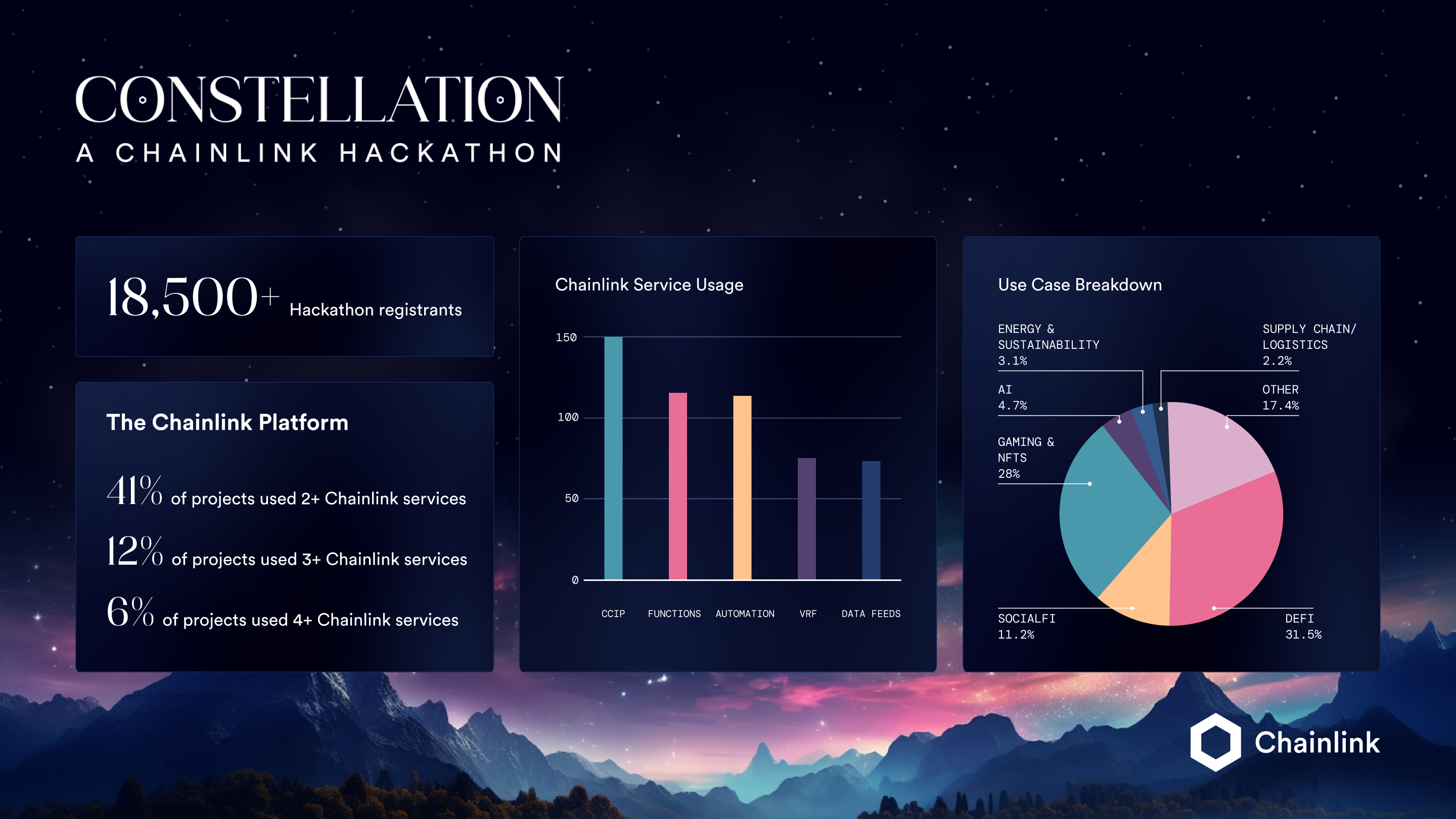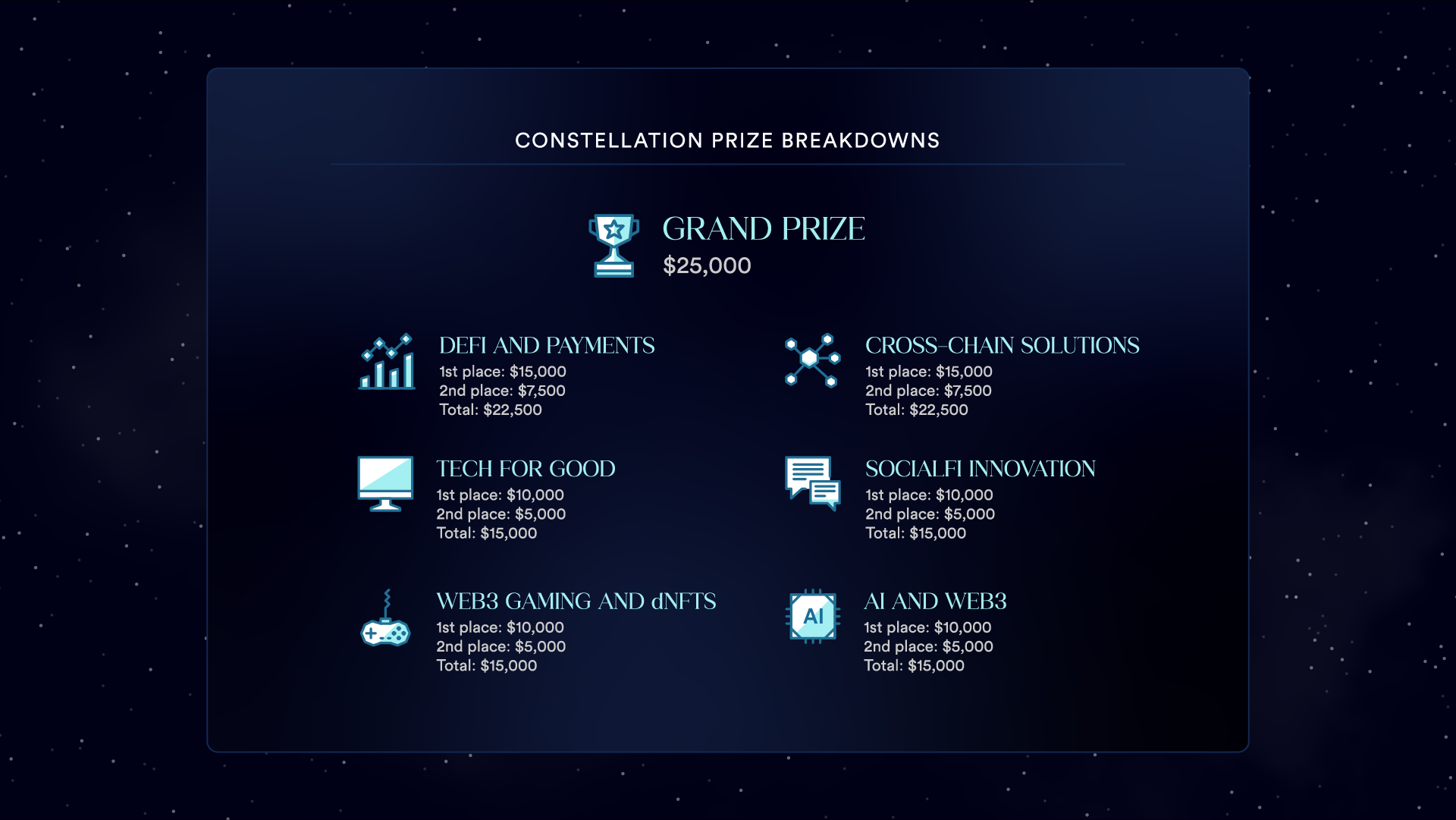Announcing the Winners From Constellation: A Chainlink Hackathon
The idea behind Chainlink hackathons is simple: Give developers the right combination of tools and they’ll build applications that fundamentally reshape user experiences, community incentives, business processes, video games, and more.
“If you can dream it, you can build it at Constellation.”—Rory, Director of Community at Chainlink Labs.
This has never been more true than for Constellation: A Chainlink Hackathon, which marked the first time that Web3 developers had access to Chainlink CCIP and Functions. These two powerful services were built to be primitives for all Web3 developers and tailored to be flexible enough to unlock any use case. With the ability to build secure cross-chain smart contracts and efficiently connect to any API, Constellation hackers reimagined what Web3 will look like.

A huge thank you to all the participants, judges, sponsors, and mentors involved in the hackathon for making Constellation the biggest yet.
We are proud to present the prize-winning projects.
Hackathon Prize Winners
Constellation: A Chainlink Hackathon featured six prize categories, each tailored toward a specific vertical in Web3. The grand prize of \$25,000 was awarded to the best overall project across any vertical, with $500K+ up for grabs in total.

Grand Prize ($25,000)
Unwallet.me
The Grand Prize for Constellation: A Chainlink Hackathon was awarded to Unwallet.me, a seedless, gasless, and natively multi-chain smart wallet built by developers Piotr Grochowski, Nimish Agrawal, Dennis Zoma, and Mike Schneider.
The goal of Unwallet is to lower the friction of onboarding new Web3 users by abstracting away private keys and blockchain fragmentation while maintaining top-tier security. Unwallet leverages account abstraction (AA) to create a seedless wallet and CCIP to natively connect to any blockchain, all while being connected to a single domain name.
The wallet itself includes a dashboard that enables users to see their aggregated digital assets across all blockchains, denominated in fiat using Chainlink Price Feeds.
DeFi and Payments Prize ($22,500)
First Place: Azurance ($15,000)
Created by developers Ittiwat Whangdee, Krittamet Petchkor, Tanakorn Karode, Apichaya C, and born-sorravit, Azurance is a feature-rich, onchain insurance market where anyone can build and enter into customized insurance contracts. Within Azurance, Chainlink CCIP helps enable payment across multiple networks, Chainlink Functions helps fetch external data, and Chainlink Data Feeds unlocks access to high-quality price data for market-related insurance.
Second Place: Quantum Hedge Fund ($7,500)
Quantum Hedge Fund is an onchain hedge fund that implements advanced offchain fund management strategies via a quantum algorithm for portfolio diversification. Built by developers Yash Goyal, Jessica Pointing, and Cláudio Barreira, Quantum Hedge Fund uses Chainlink Functions to fetch asset prices and deliver them onchain, Chainlink Data Feeds to access high-quality, security-first asset prices, and Chainlink Automation to rebalance fund allocations on a regular basis.
Cross-Chain Solutions Prize ($22,500)
First Place: XTF ($15,000)
Created by developer Gaetano Mondelli, XTF is a decentralized, cross-chain ETF underpinned by CCIP that organizes assets into multiple smaller vaults that hold a portion of the overall asset mix. Additionally, XTF enables users to return their ETF tokens and redeem the actual assets stored in these vaults—a flexible arrangement that doesn’t exist in the world of finance today. The project uses CCIP to enable access to digital assets across blockchains, Chainlink Price Feeds to help users accurately convert assets when contributing liquidity or redeeming their positions, and VRF to help randomly distribute DAO tokens.
Second Place: Smart Heart Invoice ($7,500)
Smart Heart Invoice is a blockchain-enabled platform for invoice creation and processing built by developers Noppawan Saeong, Rattiporn Auttasuradee, Jetnipat Thankeatphangan, Nichakan Jaisaksern, and F Basher. Sellers can use Smart Heart Invoice to structure their invoices and send payment requests to buyers, with Chainlink Functions used to track and update the status of invoices from offchain systems. Then, the buyer can submit payment to the seller’s wallet on any chain using CCIP. Additionally, sellers have the option to automatically claim payments as they occur using Chainlink Automation.
Web3 Gaming and Dynamic NFT Prize ($15,000)
First Place: Ceptor Tech Team ($10,000)
Ceptor Tech Team is a Web3 gaming project in the tabletop RPG (TTRPG) genre built by hackathon team members Tippi Fifestarr, Amy Shafe, Eman Herawy, Giga Hierz, and Aire S. During the hackathon, the team focused on creating a seamless, multi-chain RPG experience and end-to-end user journey. This included enabling users and gamemasters to burn dice to completely randomly chosen challenge, which required the use of both Chainlink VRF and Automation.
Additionally, the project’s Ceptor Club ID (CCID) receives cross-chain messages from other elements of the larger Ceptor game using Chainlink CCIP, Chainlink Functions to query the game’s Web2 backend, and Chainlink Price Feeds to enable users to purchase dice with digital assets at a fixed USD price.
Second Place: DecentralAds ($5,000)
DecentralAds is a tool for building in-game advertisements that can be showcased across a variety of games. At a high level, DecentralAds serves as a bridge between software houses, sponsors, and gamers, facilitating connection between the various players in the video game industry.
Built by developer Andrea Tedesco, each decentralized ad (DAd) is a dynamic NFT that can be bought and sold among advertisers. For example, an advertiser who buys a particularly high-traffic DAd can change the dNFT’s metadata to reflect the ad they want to publish in a particular game. The project uses Chainlink Functions to distribute metadata changes to IPFS, Chainlink Price Feeds to denominate payment for dNFT transactions, and VRF for in-game raffle functionality.
SocialFi Prize ($15,000)
First Place: DEVMentor ($10,000)
DEVMentor is a cutting-edge SocialFi dApp designed to help Web3 developers learn by connecting mentors with mentees based on specific criteria such as language, teaching focus, and engagement duration.
Built by developer Maxime Eliazord, DEVMentor provides mentees with the option to either choose a random mentor using Chainlink VRF or to lock up a minimum amount (denominated in USD using Chainlink Price Feeds) to gain access to a specific mentor. Chainlink Automation monitors availability to match mentees and mentors in real-time as spots become available. Mentees and mentors are also rated by their peers and rewarded with various perks for outstanding behavior, with Chailink Functions used to send emails to confirm external sponsor rewards when a user redeems their rewards onchain.
Second Place: Trumen World ($5,000)
An immersive digital 1:1 overlay of a real-world map, Trumen World encourages users to explore their surroundings and discover new places by incentivizing them to uncover the mists of the TruVerse world map and earn TRU for each successful exploration. Created by team members Huairuo Yang, Sherry Zhang, Wayne Li, and Jacky Chen, Trumen uses Chainlink CCIP to send verification of a successful hunt from Ethereum to its hub on Polygon, which then calculates a random amount using VRF that’s based on a min-max range. This airdrop amount is then delivered as a message back to Ethereum using CCIP, where the user is rewarded with their airdropped tokens.
Web3 and AI Prize ($15,000)
First Place: OpenTruth ($10,000)
Developed by Chainlink Community Advocate Roberto Iturralde, OpenTruth helps the average citizen identify, verify, and understand government bills by using a combination of Chainlink Functions, blockchains, and AI. To start, the application presents a list of recent bills to the user. When a specific bill is selected, Chainlink Functions pulls the data from the U.S. Congress website and posts an onchain transaction that includes the link to the bill—providing cryptographic verification that it is the correct bill.
The application then offers the user a custom AI prompt that they can copy and enter into an LLM, such as ChatGPT, for a summary of the bill to dive deeper into the bill’s contents.
Second Place: HyperCluster ($5,000)
Hypercluster is a permissionless and automated Web3 user referral system built by developers Diane G., richking_hp wang, and Alexander Lin as an alternative to quest-to-earn and airdrop platforms, which optimize for historical onchain activity. In contrast, Hypercluster employs a referral program that incentivizes real activity in the future, with a delayed reward mechanism based on desired and customizable metrics such as onchain transaction volume and total value locked (TVL).
The project uses Chainlink Functions to connect to AI systems that help prevent Sybil attacks and detect bots, CCIP to help enable cross-chain staking and rewards claiming, Price Feeds to determine reward criteria, and Automation to execute reward distributions.
Tech for Good Prize ($15,000)
First Place: Dupe Defender ($10,000)
Dupe Defender is a content verification service that helps users and creators alike identify the provenance of a given piece of content and mitigate the efficacy of duplicate content. Built by Corrino Shaddam and Viet Nguyen, Dupe Defender uses a combination of Web3Auth, Polygon DID, and Chainlink Functions to build a comprehensive system that enables creators to protect their content and users to verify content.
For example, a YouTube content creator could verify a specific video is theirs by inputting the YouTube video link in Dupe Defender and then adding a specific line to the Youtube video’s description. An API connected to Chainlink Functions would then confirm the specific description change has occurred, which would verify that the creator has access to the YouTube account, and thus that they have created the video.
Second Place: ZKP Services ($5,000)
ZKP Services is a zero-knowledge data security protocol that integrates zero-knowledge proofs with both Web2 platforms (like Google Cloud and AWS) and Web3 platforms, ensuring the highest level of privacy and security for sensitive data, such as medical data.
The project offers robust, custom two-factor authentication underpinned by sophisticated security algorithms in combination with Chainlink VRF and Automation. Additionally, Chainlink CCIP makes the project available across any EVM-compatible chain.
Top-Quality Prizes
In addition to the main prize winners listed above, the following 20 projects were awarded a Top-Quality Prize for their outstanding implementations.
- AYARA Wallet
- CCFV
- ChainGame
- ChainRunners
- CozyVerse
- CrossPay
- Dexodus
- EZP2P Finance
- Seekers Alliance
- Greenscreen
- Happy Fun Kill Club
- Horizon
- Link: Become Human
- Mistransfer
- Palmcivet’s Custom Derivatives
- Randomizer Network
- Ringsig Protocol
- Shylock
- Virtual Hops
- Whisper Asset Transfer
Constellation: A Chainlink Hackathon Is Officially Complete
A huge thanks once again to all the developers, sponsors, judges, mentors, and more who made Constellation: A Chainlink Hackathon the largest and most successful Chainlink hackathon to date. The talent, dedication, and creativity of Constellation hackers was inspiring to see, and a clear representation of our industry’s bright future.
We look forward to seeing these standout projects take the leap to become full-fledged startups, and we encourage developers who are just starting out—or still have much to learn—to continue on their Web3 development journey.
“Constellation was our best, most successful hackathon to date, both in terms of quality and quantity.”—Harry Papacharissiou, Developer Advocate Manager at Chainlink Labs.
The next Chainlink hackathon will take place in spring 2024—stay tuned for more information in the coming months. For now, we invite you to stay connected by following the official Chainlink X account, joining the Chainlink Discord, and checking out the Chainlink Developer Hub.
